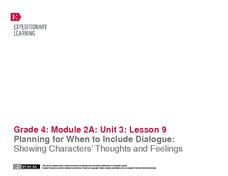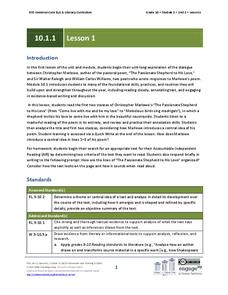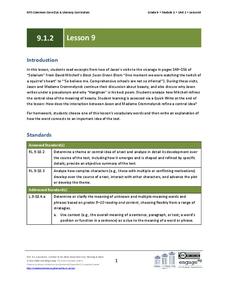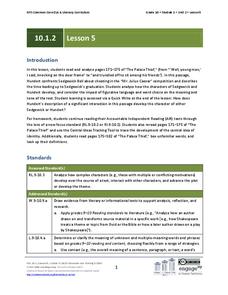Speak Truth to Power
Elie Wiesel: Speaking Truth to Genocide to Power
Invite your learners to discover the efforts of Night author Elie Wiesel to promote awareness of genocide in the world. After watching and reading an interview of Elie Wiesel, high schoolers work to create a living Holocaust...
Scholastic
Story Map
Simplify a short story or novel in your language arts class with a story map. The graphic organizer includes fields such as title and author, main characters, and problem and solution.
Curated OER
Earth's Water Sources
General facts about Earth's water sources, human use, and the water cycle are outlined by this presentation. Slide three has a grammatical error and slide nine refers to the local watershed of the author, so you will need to make a few...
Arts Midwest
The Stories and Poems of Edgar Allan Poe: Biographical Criticism and the Speaker of a Poem
Author's are often influenced by events in their own lives as they write. Use Edgar Allan Poe's poems "Ulalume" and "Annabel Lee" to take a look at how the death of Poe's wife affected his poetry. Ask students to discuss and compare the...
Laura Candler
ABC’s of Me!
Young authors share all about themselves with this printable autobiography resource. Including 26 different sentence frames, one focusing on each letter of the alphabet, students write about everything from an adventure they...
Curated OER
How Do Adjectives Improve Writing?
Using adjectives to create vivid descriptions is the focus of exercises in this resource. A cloze reading activity asks class members to add missing adjectives to passages from Mark Teague's The Lost and Found. They then read...
PBS
Storybook
Encourage young writers to tell their stories with a fun format. The title page provides space for a picture, author's name, and illustrator's name. Next, a story page includes lines for a short story, and a final page announces the...
Curated OER
Pi Day: The Other Math Holiday!
Happy Pi Day! This collection of games, experiments, and activities leads participants through an exploration of the many aspects and attributes of that mysterious quantity, pi. Activities range from using statistical...
Student Handouts
Book Report Template
Help your youngsters frame their thoughts and begin to organize notes for their next book reports. This template includes space for a book citation, author background, synopsis, and critique
Do2Learn
Book Report
Tackle the basics of plot with a straightforward book report form. Learners note down the author and title, setting, characters, and basic plot points in any story or book.
Novelinks
The House of the Scorpion: Request Strategy
Readers of The House of the Scorpion try to stump their teacher in a QAR questioning game. Pairs craft Right There, Think and Search, On Your Own, and the Author and You questions and the class members then take turns responding to...
Novelinks
The Chosen: QAR
Question the text with a reading comprehension activity based on Chaim Potok's The Chosen. Learners read four passages from the book and decide if the question after each passage is between the reader and the author, for the reader...
Novelinks
The Devil’s Arithmetic: QAR Strategy
Asking questions about the text is an important way for kids to become critical readers. Use a QAR activity based on The Devil's Arithmetic to help learners decipher between questions that are right there, between the author and the...
University of Adeaide
Basic Trigonometry and Radians
A fabulous set of examples and problems that introduce basic trigonometry concepts, this packet is set apart by the care it takes to integrate both radians and degrees into the material. After defining radians, the author demonstrates...
EngageNY
Grade 9 ELA Module 1, Unit 1, Lesson 9
Find the central idea in an excerpt from Karen Russell's "St. Lucy's Home for Girls Raised by Wolves" with a literary analysis instructional activity. As your class analyzes a section of the story, they determine how the author forms the...
EngageNY
Planning for When to Include Dialogue: Showing Characters’ Thoughts and Feelings
Young writers examine dialogue conventions, including indentation, quotation marks, and expressing thoughts and feelings through a fictional text. By noticing where and when authors use dialogue, they decide how to incorporate dialogue...
EngageNY
Qualities of a Strong Literary Argument Essay
One activity, two essays, and one central theme: qualities of an argument essay. Here, scholars first describe the qualities of an argument essay regarding Bud's rules to live by from the novel Bud, Not Buddy by Christopher Paul Curtis....
EngageNY
Grade 10 ELA Module 1: Unit 1, Lesson 1
Can authors speak to each other across works, genres, and centuries? Study the conversation between Christopher Marlowe in his poem "The Passionate Shepherd to His Love" and the responses by Sir Walter Raleigh and William Carlos Williams...
EngageNY
Grade 10 ELA Module 1: Unit 1, Lesson 5
If you've ever wished you could respond to an author's message, an instructional activity that connects three poems with the same concept will appeal to you. Based on the first few lessons' focus on Christopher Marlowe's "The Passionate...
Maryland Department of Education
The Concept of Diversity in World Literature Lesson 1: Unit Introduction
To launch a unit study of the concept of diversity in World Literature, class members compare Chinua Achebe's essay, "An Image of Africa: Racism in Conrad's Heart of Darkness" and Richard Rodriguez's essay, "The Chinese in All of...
EngageNY
Grade 9 ELA Module 1, Unit 2, Lesson 6
Guided by the provided questions, readers of David Mitchell's "Hangman" examine the author's figurative language to develop the constant struggle in Jason and Hangman's relationship.
EngageNY
Grade 9 ELA Module 1, Unit 2, Lesson 9
Class members continue their discussion of David Mitchell's Black Swan Green, focusing on how the author uses the conversation between Jason and Madame Crommelynck to refine his central idea of the meaning of beauty.
EngageNY
Grade 10 ELA Module 1: Unit 2, Lesson 5
Readers of "The Palace Thief" focus on how the author's descriptions and word choices reveal the characters of the narrator, Sedgewick, and the senator.
EngageNY
Grade 10 ELA Module 1: Unit 2, Lesson 6
Is history "little more than a relic," as one of the characters in "The Palace Thief" contends? Has Hundert's love of antiquity kept him from changing with the times? Readers consider how the author uses these conflicting views to...
Other popular searches
- Authors Purpose
- Author's Purpose
- Author Study
- Authors Point of View
- Authors Purpose Powerpoint
- Authors Purpose Mini Lesson
- Author Research
- Authors Purpose Passage
- Georgia Authors
- Authors Study
- Teaching Author's Purpose
- Student Authors























